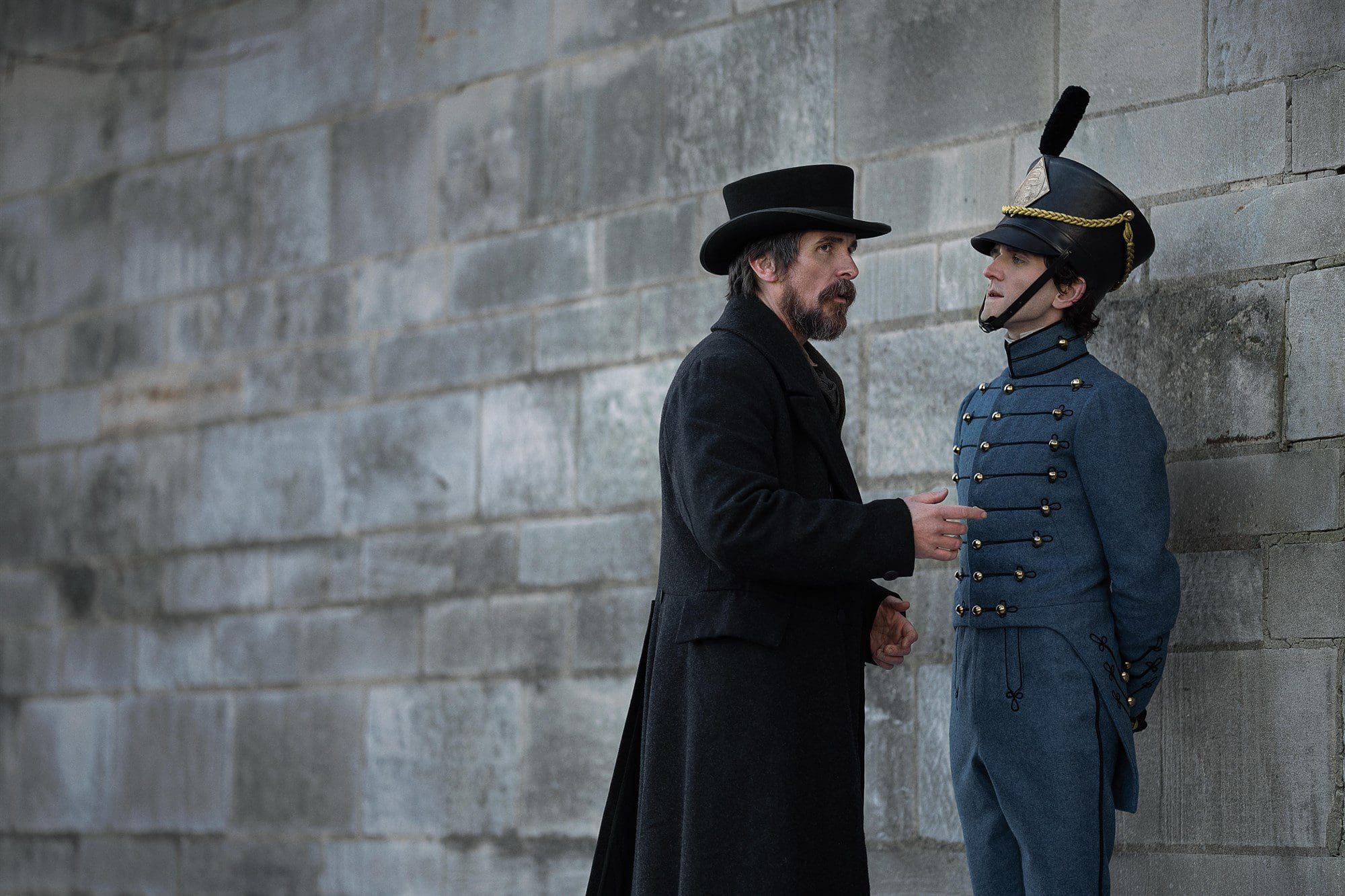
Director Scott Cooper and actor Christian Bale reunite for The Pale Blue Eye, a new period murder-mystery thriller for Netflix that shows a lot of potential but struggles to live up to it.
The film, based on Louis Bayard’s 2003 novel of the same name, follows veteran detective Augustus Landor (Bale) as he’s called up to the U.S. Military Academy West Point, New York in 1830. After the grisly death and mutilation of one of the academy’s students, Landor is tasked with investigating the crime scene, but soon finds that there’s a murderer with a greater plan unfolding. Now, with the help of a young cadet named Edgar Allan Poe (Harry Melling), Landor is forced to hunt down this killer before they enact more grisly and obscene killings on the students.
Pretty much from the first few shots of The Pale Blue Eye, Masanobu Takayanagi’s cinematography brings viewers into a moody and dark atmosphere. The very foggy and dimly lit feel evokes palpable chills throughout, fitting for the its grisly murder-mystery. hte film’s sense of darkness comes through visually at nearly every turn and it helps elevate the grim and brutal nature of the killings as well as Landor’s investigation. It honestly feels perfect for a Poe-like horror story and it matches the tone of the central narrative well. Cooper’s films always manage to have a great atmosphere, but The Pale Blue Eye might have one of his strongest, as it deeply elevates the dark natures of its story and characters.
At first, there is something curious about Landor, Poe, and the overall case that easily gets its hooks into you. There’s nothing like being swept into a horrifying murder-mystery with an ominous detective like Landor, who’s clearly haunted by his past. Bale is pretty adept to playing characters like Landor, so there’s something pleasantly familiar in his performance in the first few scenes. The inclusion of Poe also adds some intrigue to the story, since the younger version here isn’t exactly like most would imagine the usually melancholy and grim poet. Plus, the film’s story feels like it could come from Poe himself, so it feels natural that he’s here. The Pale Blue Eye shows a lot of promise early on to be a dark murder-mystery that keeps you gripped on its discoveries.
However, it can’t maintain its momentum and intrigue. The pacing is just way too slow throughout and the film never feels like it’s stringing you along in the right ways. It’s so rare when you’re getting a new clue or idea of what’s happening that you lose investment in the story as it goes on. There’s also way too much going on in this story that takes too much attention away from the film being a simple murder-mystery. There’s this supernatural satanic ritual idea thrown in for almost no reason, especially when you find out who’s really behind everything, and a lot of the chatting with potential suspects and witnesses rarely leads anywhere meaningful.
Also, the performances rarely deliver anything too memorable. Bale is pretty much delivering his usual grizzled goods and while Melling has some good moments, this characterization of Poe definitely holds things back. While it’s understandable that this younger version of Poe would be different than how most know him, there’s no identifying traits that make this depiction really feel like you’re watching Poe. Honestly, he comes off more like a cliché plucky second-in-command to Landor more than Poe. If there were some dashes of darkness to him, maybe there could’ve been something there. But it’s just a drab portrayal that rarely ever makes you think of the prolific author.
The only possible saving grace that The Pale Blue Eye could’ve had is in its final act twist, but it’s severely mishandled. Rather than it coming like a swift punch to the gut, the film totally waters down its twist by over-explaining itself. The use of flashbacks is completely unnecessary and only works in extending the film’s runtime. As the film tries to pull back the curtain on what’s played out, it just drains all the emotion and interest you could have in this big reveal. On its own, The Pale Blue Eye’s big reveal has a lot of potential to shock and horrify viewers because it’s a damn good twist, but the film ultimately gets in its own way by thinking it needs to explain every detail when it doesn’t.
The Pale Blue Eye shows a lot of promise early on that it simply can’t maintain. Thus it’s ultimately an underwhelming mystery that drags on for too long and is unable to capitalize on its atmosphere, acting talent or narrative strengths.

